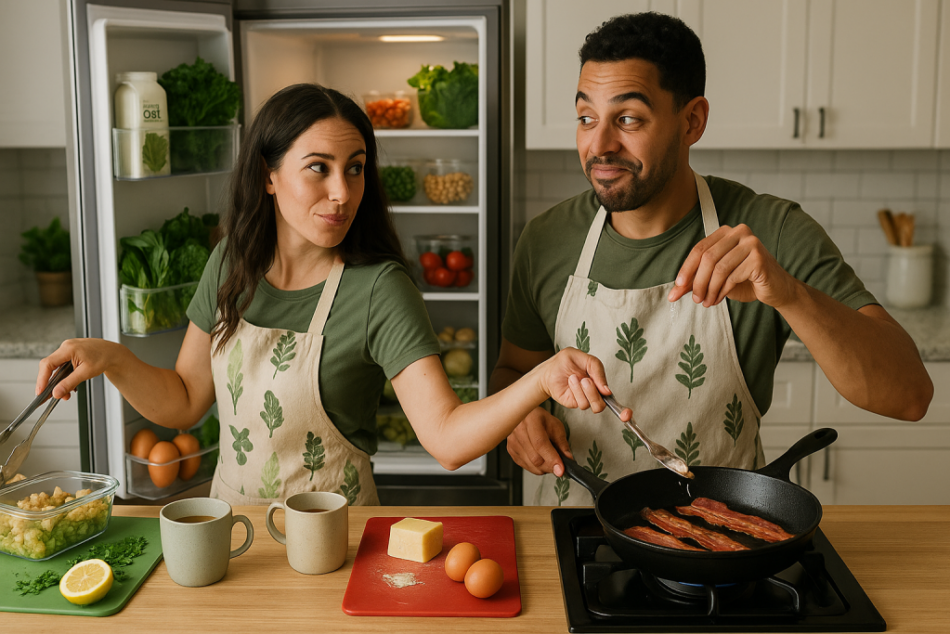The first time my partner and I had “the cheese fight,” we were in the grocery store, and it was so ridiculous that we both started laughing mid-argument. There we were, two adults who’d successfully navigated career changes, family drama, and a cross-country move, completely undone by whether mozzarella belonged in the shared fridge.
Three years later, we’ve learned that vegan/non-vegan relationships come with their own unique choreography of conflicts—predictable, sometimes absurd, but ultimately manageable once you understand the patterns. After watching dozens of mixed-diet couples navigate these same waters, I’ve noticed the same fights happening in living rooms everywhere. The good news? Once you recognize them, they become remarkably solvable.
1. The “where should we eat?” exhaustion
Every dinner out becomes a negotiation summit. They want the steakhouse, you want the vegan place, you both end up at mediocre restaurants neither of you wanted, growing quietly resentful.
The real issue: Food is comfort, and nobody wants their comfort to feel like sacrifice.
The fix: Create a “both win” restaurant list together. Research places with genuinely good options for both—Ethiopian, Middle Eastern, Asian spots often excel here. Rotate who picks. Once a month, each person gets a veto-free choice where the other goes along cheerfully.
2. The kitchen cross-contamination crisis
They used the cast iron for bacon. You used their cheese grater for cashew cheese. Someone put a butter knife in the almond butter. Suddenly the kitchen’s a battlefield with invisible boundaries.
What’s happening: It’s about respect, not utensils. Crossing these lines feels like not caring about what matters to your partner.
Solution: Have the “zones and tools” talk when calm. Designate items as separate (two cutting boards, labeled), vegan-only (that cast iron), or communal (the microwave). Get a label maker. It prevents the 47th cheese grater fight.
3. The family dinner disaster
Their mom made lasagna “specially for you” but forgot about the cheese. Your family keeps asking if they’re “converting yet.” Someone always feels like they’re betraying someone.
The deeper issue: Family food represents love, tradition, and identity. Rejecting the food feels like rejecting all of it.
How to handle it: Prep families separately. Give parents one easy win—a dish everyone can eat. Bring a stellar shareable dish. Most importantly: protect each other. When their dad makes bacon jokes, they shut it down. When your sister starts evangelizing, you redirect.
4. The future kids question
If you have kids, how will they eat? This theoretical fight about hypothetical children has ruined more date nights than anyone admits.
What’s really happening: It’s about whether your values can coexist long-term.
The approach: Discuss concerns, not positions. Instead of “kids should be vegan” versus “kids need choice,” talk about wanting healthy kids, sharing values, avoiding mealtime battles. Focus on common ground: health, compassion, family harmony. Remember that future you will have more experience than current you.
5. The smell wars
Bacon lingers. Nutritional yeast “smells like feet.” You’re both convinced the other’s food is an assault on your senses.
Truth: Smell is visceral and involuntary. You can’t logic your way out of nausea.
Practical fix: Cook the controversial stuff when the other’s out, with windows open. Invest in a good air purifier and candles. Acknowledge that yes, some vegan cheese smells weird, and yes, meat has a distinct smell. You’re both right.
6. The grocery bill battle
Two milks, two cheeses, two everything. The bill has doubled, and you’re arguing about oat milk prices while ignoring that you’re shopping for two different households.
The real problem: Money fights are about values and priorities, plus genuine sticker shock.
Smart solution: Split it—shared budget for basics (produce, pasta, bread), individual budgets for specialty items. Find genuine overlap—maybe they actually like oat milk in coffee. Stop unnecessarily duplicating.
7. The documentary incident
You wanted them to understand why this matters. They watched fifteen minutes, called it “propaganda.” Now Netflix is a battlefield.
Why this hurts: What feels like education to one person feels like attack to another.
Better approach: Stop trying to convert through media. If they’re curious, they’ll ask. Need them to understand something specific? Try: “It matters to me because I feel…” not movie night that’s secretly an intervention.
8. The “just try it” tug-of-war
They insist you try grandmother’s turkey. You push the amazing cashew cheese. Both feel disrespected.
The disconnect: “Just try it” feels like love to the offerer, pressure to the receiver.
The rule: No means no for food. No pushing, guilt, or “just one bite.” In exchange, both occasionally try things when genuinely curious—not when pressured. Curiosity must be voluntary.
9. The social event splitting
Their BBQ where you’ll eat sad lettuce. Your vegan potluck where they’ll be the odd one out. You start going separately, living parallel social lives.
What’s going on: Nobody wants to be why their partner’s uncomfortable.
Strategic solution: Pick your battles together. Some events you tackle as a team (eat beforehand, have a “rescue me” code word). Some you fly solo with full support. Decide together instead of defaulting to separation.
10. The travel food panic
Every vacation includes food subplot. They want local specialties. You’re worried about finding anything. Someone’s always hungry in paradise.
The tension: Travel should be relaxing. Food stress ruins that, plus missing “authentic” experiences feels like loss.
What works: Research ahead but build flexibility. Find vegan spots AND omnivore restaurants with real options. Pack emergency snacks. Radical idea: occasionally eat separately for one meal. They get their authentic experience, you hit that great vegan spot. Meet after, everyone’s happy.
The pattern underneath all of it
Here’s what three years taught me: these fights aren’t about food. They’re about feeling seen, respected, and chosen. When my partner ensures restaurants have good vegan options without my asking, it’s not about food—it’s about being considered. When I don’t make faces about their coffee with real cream, it’s about acceptance.
The couples that make it aren’t the ones who never fight. They’re the ones who recognize that underneath the cheese argument is a question about whether two people with different values can build something together.
The answer is yes—if you’re both willing to see the fight for what it really is.
Last week at the grocery store, my partner grabbed both regular and vegan mozzarella without discussion. “For pizza night,” they said. “So we can both enjoy it.” Three years ago, this was a fight. Now it’s just Tuesday.
That’s how you know you’ve made it work—when the solutions become so routine you forget they were ever problems.
What’s Your Plant-Powered Archetype?
Ever wonder what your everyday habits say about your deeper purpose—and how they ripple out to impact the planet?
This 90-second quiz reveals the plant-powered role you’re here to play, and the tiny shift that makes it even more powerful.
12 fun questions. Instant results. Surprisingly accurate.









